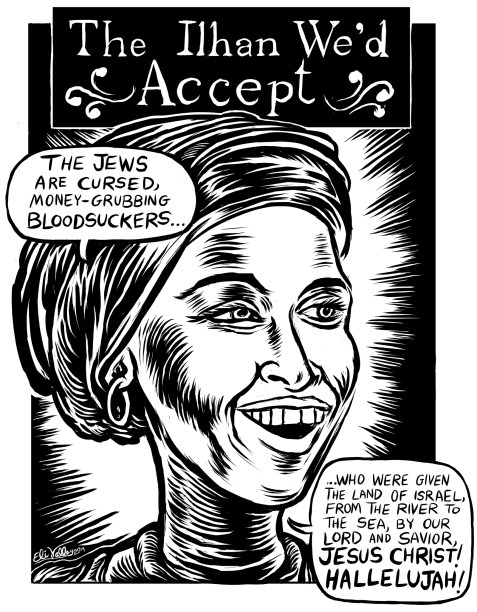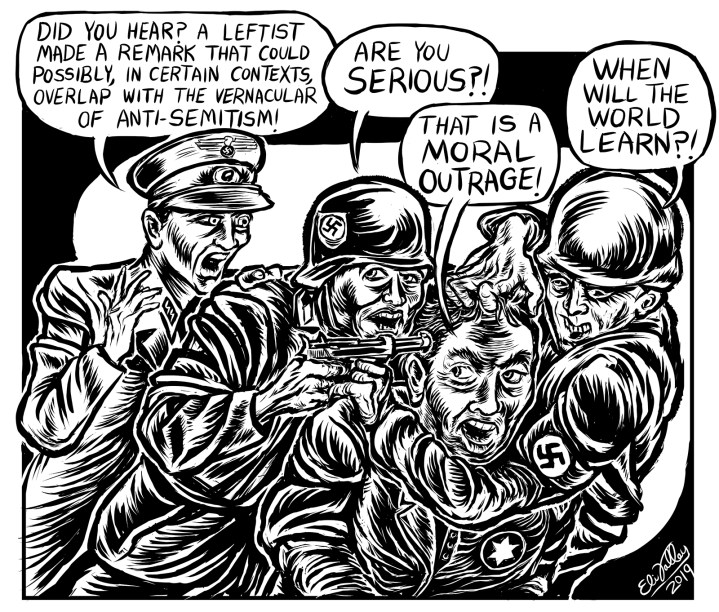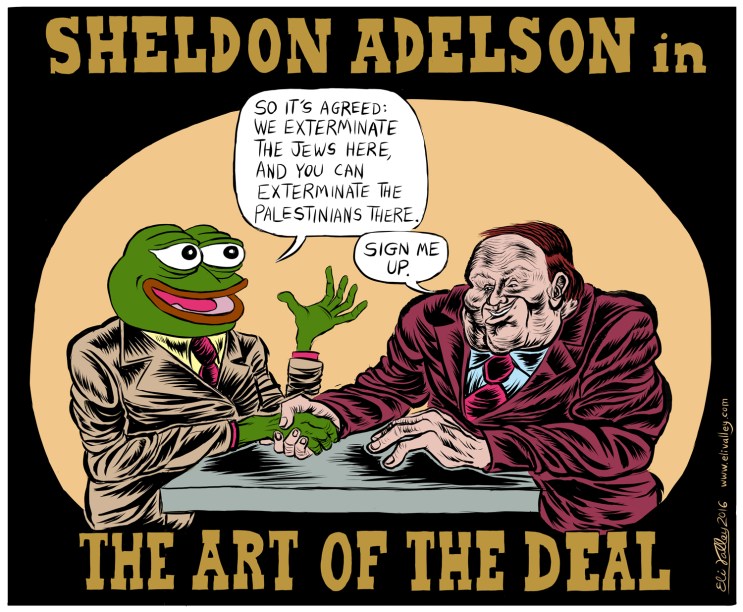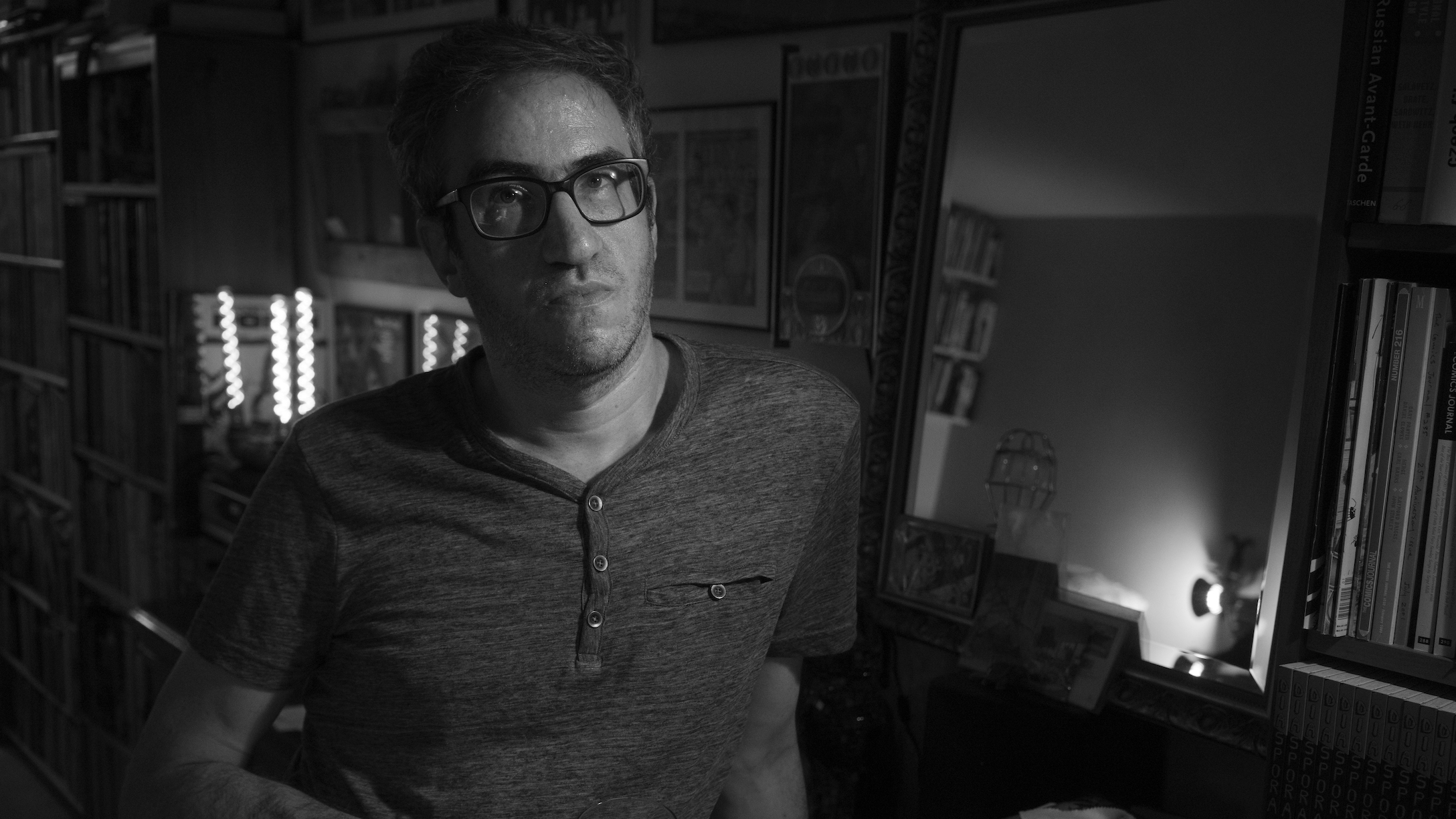In a discussion on The View, Meghan McCain was reduced to tears over Ilhan Omar’s recent comments on the American pro-Israel lobby. “Just because I don’t technically have Jewish family that are blood-related to me doesn’t mean that I don’t take this seriously,” she said.
In response, cartoonist and writer Eli Valley drew a now-infamous comic that depicted her performing her new role as spokeswoman for American Jews. McCain called it “one of the most anti-semitic things I have ever seen.”

It’s not the first time such things have been said about Eli Valley and his work, much of which is collected in the anthology Diaspora Boy. But McCain seemed unaware of the controversy that has long followed Valley’s satirical commentary on American and Israeli culture and politics, adding, “this reveals so much more about you than it does me…”
What does it reveal about Eli Valley? I gave him a call to find out.
First of all, I had no idea that Meghan McCain is Jewish. What’s the story behind that?
It’s been fascinating just from the point of view of how satire becomes reality. It’s an old story, reality eclipsing satire.
There’s that Tom Lehrer line, that satire died when Henry Kissinger won the Nobel Peace Prize.
You can add Bret Stephens getting a Pulitzer for writing. Anyway, reality has been eclipsing satire throughout the Trump administration, but this is such a perfect example of it. She claimed it was her friendship with Joe and Hadassah Lieberman that made her personally traumatized by what Ilhan Omar said. So I just took it to the absurdist step of her claiming to be Jewish herself. And then her reaction was that I am antisemitic towards her, which makes the hyperbole reality.
Okay, so let’s get this established for readers who may not be familiar with your work. We’ve already established that Meghan McCain is Jewish. Are you Jewish?
By her standard, no. But I consider myself Jewish.
What’s your own relationship to Jewishness?
My father was a rabbi. My mother is a secular Jew. By the way, I don’t say my father’s a rabbi for street cred or any kind of clout.
Meghan McCain’s dad, if I’m not mistaken, I don’t think was a rabbi.
I once published a Jewish travel guide to Central and Eastern Europe, and at the time I actually did think it would help the book, noting that my father was a rabbi. But right now, saying my dad’s a rabbi, I’m not saying it to establish any kind of street cred, it’s just the facts.
I grew up observant until my parents got divorced. Then I was observant when I was visiting my dad, and at my mom’s I was secular. So it created a sort of multiple affiliation background.
So there’s a kind of—as a non-Jew myself you can correct me here—but there’s one sense of being Jewish as being a member of the religion, and then there’s what’s colloquially called something like the “lox-and-bagel” type of being Jewish, where it’s an American cultural/ethnic group. Sounds like your parents represented both of those.
Yeah, I think the lox-and-bagel description, certainly for secular Jews, is slightly a caricature, and I think it’s used often by Orthodox or Zionist Jews to erase the validity of the majority of American Jews. It’s one of the tools at their disposal, basically. You know, saying we’re just Seinfeld Jews, we’re just lox-and-bagel Jews.
When I say secular I don’t just mean purely Yentl or Fiddler on the Roof. It’s definitely informed by Jewish values, but not in a religiously observant sense.
What about now, do you see yourself as belonging to one or the other?
I’m not religiously observant at all. But it’s not only cultural either! Judaism is such a multi-faceted identity, and expression of one’s essence, that it encompasses both culture and values.
That’s something that comes up in regards to your work, the latest being this depiction of Meghan McCain. You have an eye for the grotesque. I look at the comic and I recognize that it’s Meghan McCain, but I also wouldn’t have seen her that way unless you showed her to me that way. I’m thinking in terms of this idea, and it might be a diasporic idea, of “Jewish humor.” Usually when people say that they’re talking about Henny Youngman or Woody Allen, but for you, it’s embodied more by Mad Magazine.
Yeah. I mean, I do think there’s an overlap!
Do you see yourself as having a specifically “Jewish” aesthetic? I’m thinking in terms of your satirical approach.
Yes, for sure. I draw from what I call my own “ethnic pride” over the creators of Mad—Harvey Kurtzman, Will Elder, and the rest of the crew of Jewish children of immigrants living in New York City, with an office in what is now condos and a Duane Reade. That’s where they were revolutionizing American comedy in the 1950s.
Do you see that as bearing on your visual aesthetic as well? Do you see monsters in the right-wingers you draw, just when you look at them, or does it emerge as you draw them?
You’re asking if I see them in—what’s that film noir word?
Chiaroscuro?
Yeah, thank you, no, I’m not quite a dog who sees things in, such, whatever. But I do see them as monstrous personalities, and ethically beyond the pale of what we’re supposed to be when we’re acting with empathy towards other humans, and I try to convey that in my art.
But I’ll be honest with you, it’s my personal aesthetic, I like drawing this way, even when I’m drawing friends. I find the art to be aesthetically appealing, but others might find it offensive.

I don’t think you make everyone look like a monster. But when you do, it’s uncanny to me how much I can recognize them in the grotesque image you present.
Do you think Meghan McCain looked like a monster?
Yeah. But it also looked like her.
Good, good. It’s difficult when drawing women in particular, because the grotesquerie is more easily matched with male-presenting figures.
And you’ve certainly done that.
Well it just happens that people in power happen to be more men than women. I’ve gotten a couple responses concerning fat-shaming, and I am sensitive to that. It’s sort of an impasse when it comes to this, because all of my art involves like, folds of flesh. Whether the person is a certain weight or not.
Flesh is central to your aesthetic.
It can be interpreted as being fat-shaming, but that’s not the goal. And I do apologize if it increases societal judgment of people of different weights. That’s not it. I find it, aesthetically, visually enticing—bodies and flesh—when working on the art.
Let’s put this in context. I’ll start with what happened afterward and then we’ll go to what happened beforehand. McCain said, this cartoon is “one of the most anti-semitic things I’ve ever seen.”
I’m assuming she was in a coma during Charlottesville and Pittsburgh.

Right. I mean, a drawing of someone who is not Jewish, by the son of a rabbi, she called the most antisemitic thing she’d ever seen. How does that work?
I think she identified so much as a victimized Jewish person under the onslaught of the supposed terrorist Ilhan Omar that any criticism of her is a criticism of the Jewish people. So when you’re in such a warped mindset, it’s natural you’re going to call a piece of Jewish art antisemitic.
What did you think of Ilhan Omar’s statements themselves?
Honestly, I think there is room for nuance here in the discussion. Let’s establish this first: she didn’t make antisemitic remarks, she criticized monolithic support for Israel. In America, that’s led by mostly rapture-thirsty Evangelical Zionist antisemites, and to equate Israel with Jews is itself antisemitic—à la Trump’s insistence that Israel is “our” country, and American Jews aren’t exactly American. Having said that, and knowing the discourse will be tainted from the start by bad-faith assholes, it’s worth the trouble to be sensitive about the language. Don’t give them an open! Some people, especially among older generations, will be triggered by certain phrases even if you’re not talking about Jews.
So with that in mind, ideally she could have phrased things to avoid any unintentional or momentary overlap with the historic vernacular of antisemitism. But what she said doesn’t make her an antisemite. People are making it a big deal because they’re pretending Israel equals Jews, and antisemitism is now defined as criticism of AIPAC and Likud. When talking about fealty to Israel, by, let’s be honest, mostly fucking Evangelicals, okay, the language can unfortunately overlap, or be confused with, this mythology. And if we were operating in good faith—and I’m thinking especially of Democrats here—we could have her back and help her understand these nuances instead of appeasing right-wing creeps with show trials.

This is how you correct it. You say to them, listen, certain people are sensitive about this, particularly people who have experienced the horrors that this mythology has led to. So keep the criticism, just don’t make it about puppetmasters and shit.
The reason I’m saying that is partly because my mom, who is very progressive, she initially said to me, “Oh, dual loyalty, that’s really antisemitic.” And then I explained to her the context, and the fact that she wasn’t singling out Jews in particular, and my mom said, Oh my god, yes. And she saw that. So it’s sort of a tonal thing, sensitivity to that.
But that’s the problem: It could have been addressed easily, and move on. Maybe three to five seconds out of the 24-hour news cycle. Then let’s move on to the actual national crisis at hand. And the way we know that we’re dealing with bad faith, that it was actually about her stance on Israel, is that people who have been criticizing her, and pretending she’s some kind of antisemitic terrorist, have turned this from seconds into multiple 24-hour days. We entered all-hands-on-deck catastrophe mode, while we have the hero of American Nazism sitting in the Oval Office.
When you’re talking about “both sides,” it’s true, your whole argument shouldn’t be “Oh, the other side is so much worse.” But here’s the thing—aside from the fact that Republican members of Congress say much worse things than what Ilhan Omar said, and on an hourly basis. We are dealing with a crisis unlike anything we’ve seen in decades in this country. We’re in a national crisis. And we’ve been in a national crisis since November 2016.
Some of Omar’s biggest antagonists have devoted more time to maybe three words that she said than to the man who has galvanized ethnic cleansing and white supremacy in the United States. And that is reprehensible. It’s morally outlandish, and we should not stand for this shit.
Name some names.
Oh, Seth Mandel, Bethany Mandel, who rejoiced at the White House six weeks after Trump inspired the biggest mass murder of Jews in American history.
John Podhoretz, who claims to be a “never-Trumper,” but when push comes to shove, they all line up.
Bret Stephens, Bari Weiss. Just run down the list of people who pretend to be concerned about antisemitism but it turns out that they’re only concerned with criticism of Israel, and to hell with American Jews.
If we go back to Omar’s original statement, an editor at the Forward asked her who she “thinks is paying American politicians to be pro-Israel.” And she said, “AIPAC,” which is literally a group that exists for that exact purpose. Somehow that was antisemitic?
You know what’s funny is, just as the reaction to the comic proves the premise of the comic, so the reaction to the claim that AIPAC wields excessive power proves that they wield that power.

One of the worst antisemitic stereotypes is that “Jews run the media,” but Jewish media is fairly limited. You used to work for the Forward, and you and I have both contributed to Jewish Currents, which takes a different political stance. Do these publications serve the same cultural purpose?
Tablet is right-wing. Forward was center-left, now it’s just hot takes, plus Josh Nathan-Kazis’s reporting. But the hot takes: two headlines that they did about Ilhan Omar said she was separating the Jews from the left, which I thought was such a false dichotomy.
Right, historically, the American left has always been highly populated by Jewish immigrants.
Not just historically, but today! We are the left.
For me, as a person of an ethnically Muslim background, looking at the politics of the Middle East, I was for a long time scared to speak out about it, or even hold my own opinions about it, until I realized that there is a robust and conscientious group of Jewish people in America and Israel who see the plight of the Palestinians as a human rights issue and are dedicated to addressing it. Personally it’s been empowering to me to see people like you, and the staff at Jewish Currents, just not compromising.
I appreciate that. I remember once this woman I knew, she didn’t really know the Jewish institutional world, so when I mentioned the right-wing bent she was just like, absolutely in awe, because she said, every Jew I know is on the left!
Did you have a moment when you changed your perspective? Were you raised with an equation between Jewish identity and Zionism? Was there a moment of a break from that?
Well my parents couldn’t afford to send me to Israel as much as the other kids in my day school, but I was able to finally go when I was in college, and one of the things was that I was staying in a youth hostel in Safed, and it was run by Jewish outreach types—”Kiruv” is the Orthodox term for it. Trying to bring in like, less than observant Jews into the fold. They were saying atrocious things about Palestinians. It was an extremist place. In Jerusalem going to Shabbat dinner via another one of these Kiruv places, and this patriarch, this elderly man, starts singing “Ha’aravim klavim”—”the Arabs are dogs.”
So that shook you?
Yeah, in terms of the fact that the religion could be used for racial and ethnic hatred. But it wasn’t until I became more active in the American Jewish community that I saw it wasn’t just among religiously observant people that this attitude permeated. I’m not going to say American Jewish leaders are saying “Arabs are dogs,” but there is this rightward bent that foundationally has the premise that Palestinians are less-than. And you see it filtered through the statements of Bret Stephens about the “disease of the Arab mind,” or Marty Peretz saying “Muslim life is cheap,” and all that.
That is a central aspect to your work, the tension between “Diaspora Boy” and “Israel Man.”
That’s a satire of Zionist attitudes towards world Jewry, since the inception of Zionism. I initially came up with that ten years ago but it’s becoming so accelerated now that Trump is in the White House and Netanyahu is helming Israel.
Netanyahu is choosing alliances with neo-Nazi nationalist white supremacists over the welfare and safety of the world’s Jews. You can’t get more clear-cut than that. It’s not even a punchline. It’s absurd, but it’s true. Satire is eclipsed by reality.

Meghan McCain isn’t the only one who’s called your work antisemitic. People like Abe Foxman, former Director of the Anti-Defamation League, have denounced you. Some detractors call you a “self-hating Jew.” But if your subject is antisemitism, and you’re using the mode of satire, your work has to include representations of antisemitism. How do you navigate that line?
Well with the comic what I was doing was mocking exploitation of Jewish kitsch. I’m mocking her for taking on our history and also our trauma. In one incarnation I actually considered putting her in the actual garb of a prison camp, or Auschwitz. But then I decided no, I’m going to go more towards the kitsch aspect, but I’m going to keep the Star of David in German, Jude. That was necessary, a sign of the trauma too.
There’s a bit of the lox-and-bagel aspect too.
Just a little bit, with the matzo ball soup, that she’s pouring without any liquid into the bowl. That was the centerpiece for me. I considered putting pickles, but I actually wanted to stay away from what we were talking about earlier—that’s a stereotype of secular Jews by Orthodox Jews and by Zionists who say that Jewish life will wither outside of Israel. And I didn’t want to do that. What I wanted to do is try and imagine what a person who fetishizes Jews imagines Jews are like. And that’s why, boom, Yentl. I was thinking of Seinfeld too actually, but it’s kind of a cliché. Fiddler on the Roof was possible as well.
Yentl was the right one.
I thought so. And a little dreidel. Matisyahu was the deep cut for Jews of a certain age who remember there being that like Jewish intra-communal kitsch of 10 years ago. And just the idea that she would do it now in 2019 made it absurd. Josh Nathan-Kazis of the Forward said his favorite thing about it was that tons of gentiles were totally confused. Flabbergasted. “What is Matisyahu?” So that was good. That was actually one of the signs that this was a piece of Jewish art. That’s why it’s even more absurd that she’s calling it antisemitic. It’s absurd that all these right-wing Jews who hate the majority of American Jews are calling it antisemitic.
The reason they call me a self-hater is because they define Jewish authenticity as Zionist. And the punchline to that is, the people who were the proponents of what they consider to be authentic Judaism and self-love, have now, in the aggregate, allied with forces seeking to destroy the Jewish people.
Eli Valley’s collection Diaspora Boy is available from OR Books.






